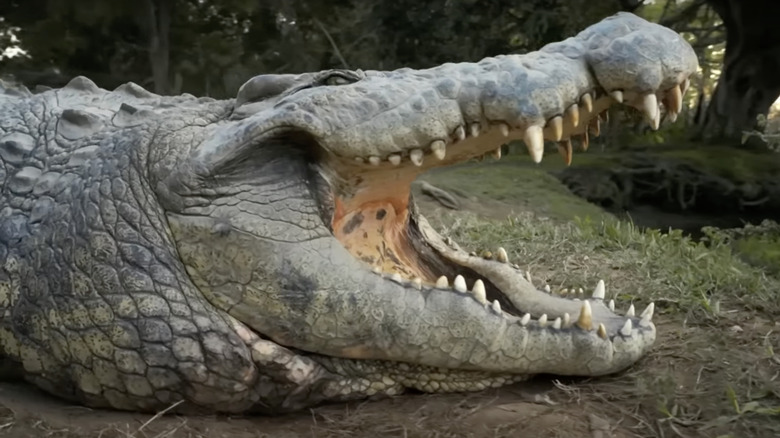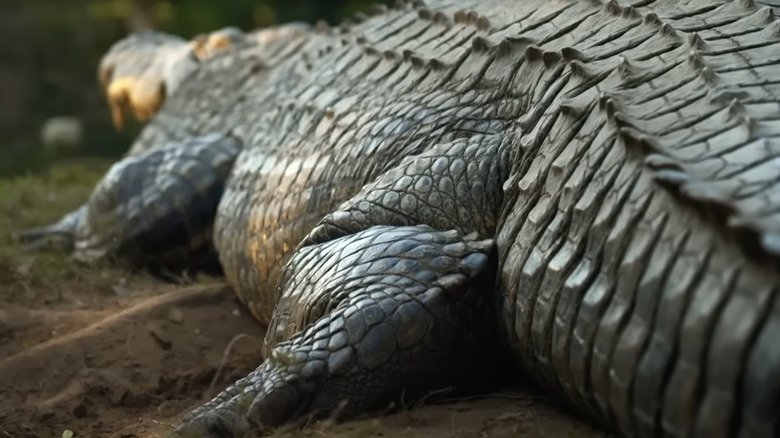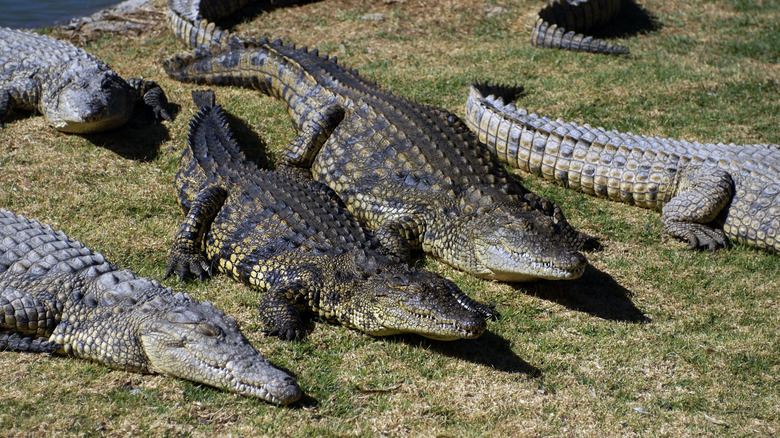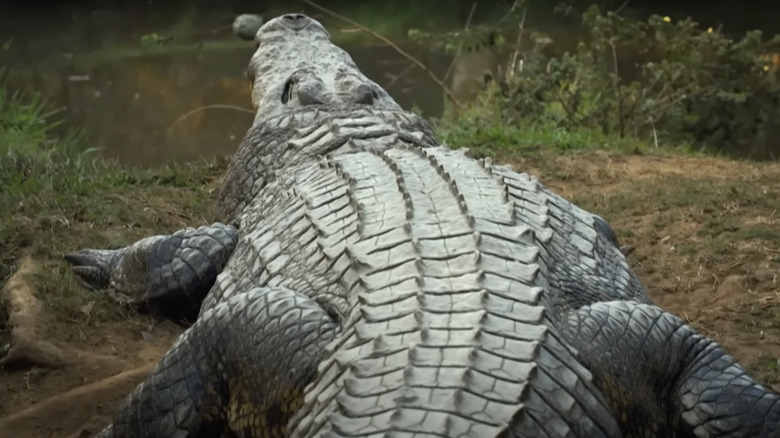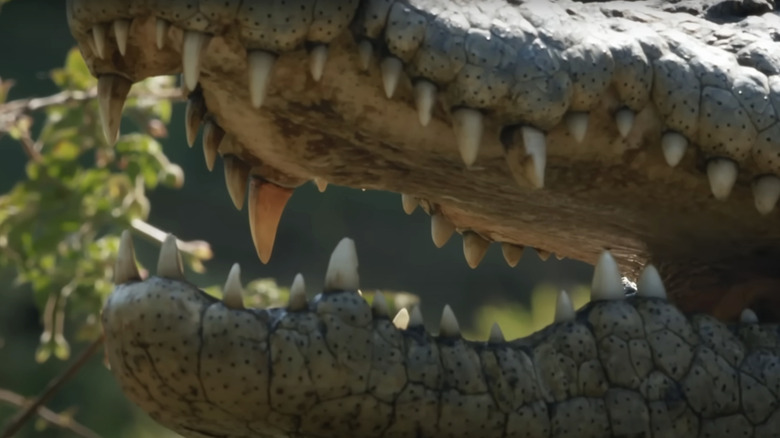The Crocodile That's Lived Longer Than Most People Probably Ever Will
One of the world's deadliest animals, the crocodile is a fascinating and genuinely terrifying creature — especially in comparison to their evolutionary cousins, alligators. Though they are often thought of as similar, crocodiles are significantly different to alligators in many ways. Crocodiles exist across the world, including in tropical oceans, while alligators are more or less confined to the Americas and China. This is mostly due to the former's ability to tolerate salt water, which allowed them to spread across the globe unimpeded by their own evolutionary adaptations.
Another major difference between the two species is size. The biggest alligator in the world is nothing compared to the biggest crocodile. Likewise, the world's oldest alligator can't compare to the world's oldest crocodile, with Muja the alligator clocking in at roughly 90 years old while Henry the crocodile recently celebrated his 124th birthday.
Henry is the world's oldest known Nile crocodile, and not only has this giant croc lived for more than a century, he has fathered more than 10,000 offspring during his lifetime. The remarkable reptile is currently living in a conservation center in South Africa, where visitors can witness his impressive form and where he's expected to survive for quite some time to come.
From man-eating menace to captive croc
Henry was born in Botswana's Okavango Delta in 1900 and lived most of his life in this vast wetland in the northwest of the country. Forming part of the Great East African Rift Valley system, the delta is formed by the Okavango River flowing into the Kalahari Desert and is host to thousands of animals, including the Nile crocodile, with approximately 2,600 of the reptiles still residing in the delta today.
During his early years, however, Henry reportedly proved to be nothing short of a menace, and is believed to have eaten several children belonging to a local tribe. As a result, the tribe is said to have enlisted hunter Sir Henry Neumann — from whom the killer croc got his name — to kill the reptile. Instead, Neumann captured Henry in 1903, and the man-eater has been in captivity since, eventually leaving the delta behind in 1985 when he and fellow Okavango Delta croc, Colgate, moved to the Crocworld Conservation Centre in Scottburgh, South Africa. He and Colgate (who is currently 90 years old) have lived at the center ever since.
Life in crocodile captivity
Today, Henry continues to thrive. Nile crocodiles (Crocodylus niloticus) are known for their size, are capable of reaching up to 20 feet in length, and weigh as much as 1,650 pounds. Henry is no different, having grown to 16.4 feet in length and weighing roughly 1,653 pounds. That makes him one of the largest crocodiles in captivity. The actual largest, Cassius, was even bigger than Henry at almost 18 feet long and 1 ton in weight. But even Cassius didn't match Henry's longevity, as the erstwhile croc passed away at 110 years old in November 2024.
Meanwhile, the staff at Henry's center celebrate his birthday every December 16, and in 2024, Henry reached the age of 124, making him the oldest known crocodile in captivity — which considering his cushy lifestyle, perhaps isn't all that surprising. As the Crocworld Conservation Centre reported in 2023, the giant reptile lives with "six wives" and has already fathered more than 10,000 offspring since arriving at the facility.
How has Henry the crocodile lived so long?
Crocodiles are known to be hardy creatures. As a 2021 study published in Heliyon explains, the reptiles not only survived the Cretaceous extinction event that wiped out dinosaurs, they are capable of tolerating all manner of habitat, residing in polluted environments and even withstanding exposure to radiation. They can feed on rotten meat without issue, and are, as the study notes, "considered as one of the hardy species that has successfully survived on this planet for millions of years."
But even by crocodile standards, Henry's age is truly remarkable. In the wild, Nile crocodiles have an average lifespan of roughly 45 years, and up to 80 years in captivity. At 124 years old, then, Henry has long since proven his unique endurance, but what is it that has kept this particular croc alive for so long?
While there's no definitive answer to that question, it likely comes down to a multitude of factors. Most obvious is the fact Henry has lived in captivity for over a century, and has been cared for throughout that time. As such, this killer croc's capture at the hands of Sir Henry Neumann likely helped him last as long as he has, especially since Nile crocodiles were hunted to the point of near-extinction from the 1940s to the 1960s. Not only has Henry's life in captivity provided him with a steady food supply, he has not had to defend himself against other crocodiles. Beyond that, Henry's long lifespan is also likely the result of some innate characteristics of crocodiles that makes them uniquely suited to surviving for long periods.
Crocodiles are built to last
Crocodiles might not be as hardy as something like nature's most indestructible organism, the tardigrade, but they are one of the more robust species alive today. The reptiles have a highly efficient, slow metabolism, which, when coupled with their large size, allows them to save energy and store fat reserves. Nile crocodiles can go without food for several months in the wild, relying solely on their fat reserves to surivive. As the Heliyon study authors note, the gut microbiome of crocodiles likely also plays a role in the animals' longevity, combining with their slow metabolism to help the creatures live for remarkably long periods.
Also helping Henry survive for so long is the fact that crocodiles are ectothermic, which means they rely on heat from external sources such as the sun or warm water, rather than generating heat within their own bodies. Not only does this allow the animals to conserve their own energy, putting less strain on the their bodies, it means the crocs can adapt to different environments much more easily than endothermic animals.
Lastly, a 2024 study also published in Heliyon explored the powerful immune system of crocodiles, noting how the reptiles' blood contains "high levels of antimicrobial peptides." This gives them not just a superb defense against disease, but allows them to survive injuries that would kill other species. Overall, then, crocodiles are well-equipped to survive for decades. But even with all this in mind, Henry is truly unique among an already remarkably hardy species.
